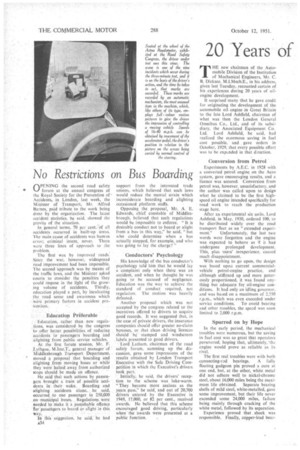No Restrictions on Bus Boarding nPENING the second road safety
Page 52

If you've noticed an error in this article please click here to report it so we can fix it.
• X--1 forum at the annual congress of the Royal Society for the Prevention of' Accidents, in London, last week, the Minister of Transport; -Mr. Alfred Barnes, paid tribute to the work being done by the organization. The latest accident statistics, he said, showed the gravity of the situation.
In general terms, 70 per cent. of all accidents occurred in built-up' areas. The main cause of accidents was human error; criminal intent.. never. There were three lines of approach to the problem.
The first was by improved roads. Since the war, however, widespread road improvement had been impossible. The second "approach was by means of the traffic laws, and the Minister asked courts to consider the penalties they could impose in the light of the growing volume of accidents. Thirdly, education played a part, by inculcating the road sense and awareness which wee . primary factors in accident prevention,
-, Education Preferable Eilucatidn, rather than new regulations, was considered by the congress to .offer better, possibilities, of reduciog accidents to passengers boarding and alighting from public service vehicles. .. At the first forum session, Mr. F.
gerieral manager of Middlesbrougb Transport Department, moved a proposal that hoarding and alighting from moving buses or while they were halted away from authorized slops should be made an offence.
He said that Such actions by passengers. brought a train of possible accidents in. their wake. Boarding and alighting accidents alone, , he said, occurred to one passenger. in 250,000 ,on-municipal. buses. Regulations. were heeded to make it a. punishable Offence for.passengers to board or alight in this In fhis suggestion, he said, he had A34
support from the interested trade unions, which believed that such laws would reduce the mental strain which inconsiderate boarding and alighting occasioned platform staffs.
Opposing the proposal, Mr. A. E. Edwards, chief constable of Middlesbrough, believed that such regulations would be impossible to enforce. " It is desirable conduct not to board or alight from a bus in this way," he said, "but who could determine when a bus actually stopped, for example, and who was going to lay the charge?"
Conductors' Psychology
• His knowledge of the bus conductor's psychology told him that he would lay a complaint only when there was an accident, and when he thought he was going to be accused of negligence. Education was the way to achieve the standard of conduct required, not regulation. The motion was heavily defeated.
Another proposal which was not accepted by the congress related to the incentives offered to drivers to acquire good records. It was suggested that, in the case of private drivers, the insurance companies should offer greater no-claim bonuses, or: that clean driving licences s,hould :he stamped and windscreen labels presented to good drivers.
''Lord Latham, chairman of the road safety forum, summing up the discussion, gave some impressions of the results obtained by London Transport Executive with the Safe. Driving Competition in which the Executive's drivers took part.
•• Initially, he said, the drivers' reception to the scheme was luke-warm. "They become more zealous as the years pass," he said, and out of 20,700 drivers entered by the Executive in 1949, 17,000, or 82 per cent., received awards. He believed that this scheme .encouraged good driving, particularly Whenthe awards Were presented at a -public function.




















































































